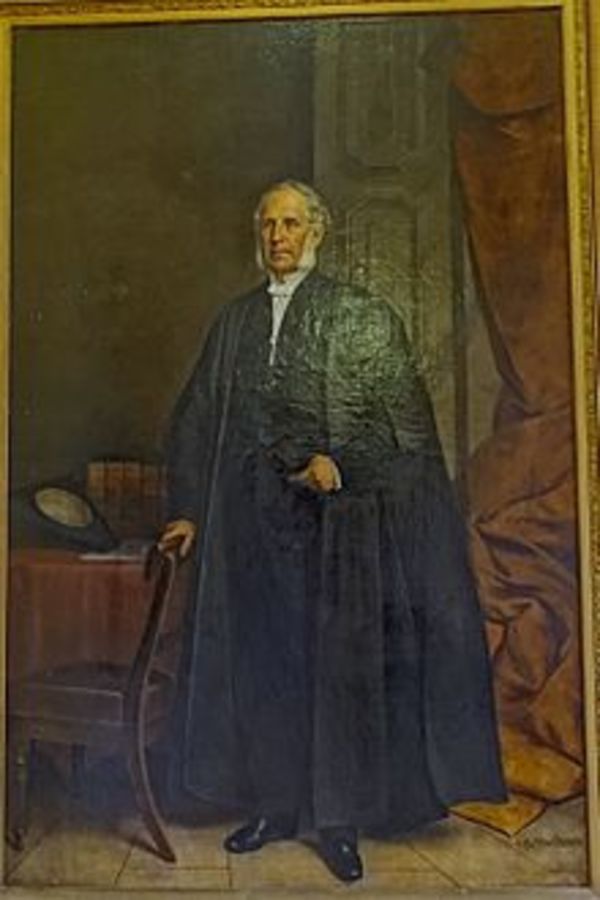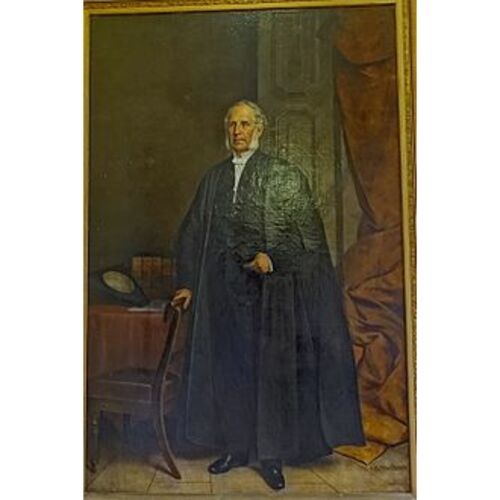
Source: Courtesy of Wikimedia Commons
SPRAGGE, JOHN GODFREY, lawyer and judge; b. 16 Sept. 1806 at New Cross, Lewisham (now part of London), England, eldest son of Joseph Spragge*; m. in 1831 Catherine Rosamund Thom, daughter of Dr Alexander Thom*, army surgeon, and they had two sons and two daughters; d. 20 April 1884 at Toronto, Ont.
John Godfrey Spragge was educated at home by his father who had come to Canada in 1820 as master of the Upper Canada Central School. Later John attended John Strachan*’s Home District Grammar School in York (Toronto). In 1823 he was articled as a law student first to James Buchanan Macaulay*, the eminent jurist, and later to Robert Baldwin*. On 14 Nov. 1828 Spragge was called to the bar of Upper Canada and immediately set up practice in York. His career in equity law, applicable for civil cases not covered by common law, was successful and his practice prospered. Shortly after John Hillyard Cameron* was called to the bar in 1838, the two men entered into partnership as Spragge and Cameron.
Spragge served as surrogate judge of the Home District from 1836 to 1841, but he had a longer judicial career in the Court of Chancery. The Court of Chancery, as it had evolved in Great Britain, and as it was to function in Upper Canada from its creation in 1837, had jurisdiction in cases involving property rights, estates, wills, inheritances, trusts, and mortgages; estates of children, lunatics, and others deemed incompetent to handle their affairs; cases concerning accidents, co-partnerships, alimony, leases, or sales; as well as cases of misrepresentation. The court could compel fulfilment of legal agreements and could commit persons found to be insane. It also governed letters patent issued by the crown. Spragge was appointed the first master in chancery on 20 June 1837 and was responsible for establishing the new court and devising a set of rules for the transaction of its business. The duties of the master included attendance at the meetings of the Legislative Council. On 13 July 1844 Spragge became registrar of the court and on 27 Dec. 1850 its vice-chancellor. Finally, on 27 Dec. 1869, he was appointed to succeed the Honourable Philip Michael Matthew Scott VanKoughnet* as chancellor. The following year he undertook a reorganization of the court which made it both more efficient and less costly.
During these years, Spragge established his reputation as an expert equity draftsman and a conscientious judge. Though not a brilliant man, he possessed qualities which made for a good jurist. His judgements were based upon careful and lengthy analysis of the facts in each case and he possessed a keen discernment of human motives. The quality of his decisions won him the respect of his colleagues. He was also active in the affairs of the Law Society of Upper Canada and of the bench generally. In 1835 he was elected a bencher of the law society and became its treasurer in 1841. He served on several of its committees and secured approval for the law society to appoint a reporter for the Court of Chancery. The reports of the court were published as the Upper Canada Jurist.
On 2 June 1847 Spragge published a letter addressed to the attorney general which suggested the establishment of a new court of appeal in Canada West. In this closely reasoned pamphlet, Spragge argued that the existing Court of Appeal was neither strong enough nor in possession of any real appeal powers, and that a new court of appeal should be formed consisting of judges from the courts of Queen’s Bench and Chancery. In the same letter, Spragge defended the Court of Chancery against those who wished to abolish it. He felt that the common law courts could not administer equity law, and that the abolition of the Court of Chancery would deform Upper Canada’s legal system. Throughout his letter Spragge displayed a deep respect for the English judicial system and showed a concern for wider access to the courts.
His standing as a jurist and his long service on the bench made his appointment to succeed Thomas Moss as chief justice of the Court of Appeal a logical one. He was sworn in on 19 May 1881 and later that year, with the passage of the Ontario Judicature Act which created the Supreme Court of Judicature for Ontario, Spragge assumed the title of chief justice of Ontario. He held this post until his death, serving briefly as administrator from 7 July to 6 Sept. 1882 in the absence of the lieutenant governor.
Although he never entered politics, some of the cases and issues before Spragge touched upon the political life of his time. On 8 July 1881 Spragge rendered judgement in the case of McLaren v. Caldwell. Peter McLaren, a lumber merchant, sought to prevent Boyd Caldwell, a rival timber merchant farther upstream, from floating his logs downstream over McLaren’s slipways. Spragge held that Caldwell did have the right to float his logs downstream through McLaren’s property. While the case was still before the courts the Ontario government under Oliver Mowat* passed the Rivers and Streams Act which also supported Caldwell’s position. However, when the act was referred to the federal government for review Sir John A. Macdonald* disallowed it on the grounds that it infringed upon private property rights, which he felt were the responsibility of the federal government. This conflict added fuel to the ongoing quarrel between the federal and provincial governments; the bill was re-enacted and disallowed again in 1882 and 1883. During this time the Supreme Court of Canada reversed Spragge’s decision, but after the Judicial Committee of the Privy Council upheld it the act was finally allowed to stand in 1884. This controversy illustrates the attempt by the courts to work out a new balance of powers under the British North America Act.
In 1883 Spragge heard the case of Hodge v. the Queen. Archibald Hodge, owner of a Toronto tavern, was appealing the right of the Ontario legislature to appoint liquor licence commissioners. These commissioners had revoked Hodge’s licence because he had allowed a billiard table to be used in his tavern after 7:00 p.m. Spragge upheld the commissioners and his decision was again sustained by the JCPC. This case was also significant in the constitutional development of the division of powers between federal and provincial governments.
As chief justice, Spragge sought to raise the salaries of the judges of the Court of Appeal so that men of ability would be attracted to Ontario’s highest court. He also thought that circuit duty for the judges should cease as it disrupted the court’s work and caused unnecessary delays. Both changes were aimed at increasing efficiency and improving the court’s position in the legal hierarchy of the province. Spragge won the support of Oliver Mowat, but encountered opposition from the federal minister of justice, Sir Alexander Campbell*, and from Sir John A. Macdonald. Although debated for several years, the issue was finally resolved in Spragge’s favour.
At the time of his death Spragge’s accomplishments as a lawyer and jurist were freely acknowledged. The law society summed up his career by lauding his zeal, uprightness, learning, and ability and said that he compared favourably with the greatest judges of any country. He was “the last of the old regime.”
J. G. Spragge was the author of A letter on the subject of the courts of law, of Upper Canada, addressed to the attorney general and solicitor general (Toronto, 1847).
AO, MU 301–9; MU 469–87. Canada Law Journal, new ser., 17 (1881): 199–201; new ser., 20 (1884): 160–61, 233–34. Canadian Law Times (Toronto), 4 (1884): 233. Globe, 21 April 1884. Toronto Daily Mail, 21 April 1884. Dominion annual register, 1884. Read, Lives of judges. W. R. Riddell, The legal profession in Upper Canada in its early periods (Toronto, 1916). Waite, Canada, 1874–96.
Cite This Article
Brian H. Morrison, “SPRAGGE, JOHN GODFREY,” in Dictionary of Canadian Biography, vol. 11, University of Toronto/Université Laval, 2003–, accessed April 27, 2025, https://www.biographi.ca/en/bio/spragge_john_godfrey_11E.html.
The citation above shows the format for footnotes and endnotes according to the Chicago manual of style (16th edition). Information to be used in other citation formats:
| Permalink: | https://www.biographi.ca/en/bio/spragge_john_godfrey_11E.html |
| Author of Article: | Brian H. Morrison |
| Title of Article: | SPRAGGE, JOHN GODFREY |
| Publication Name: | Dictionary of Canadian Biography, vol. 11 |
| Publisher: | University of Toronto/Université Laval |
| Year of revision: | 1982 |
| Access Date: | April 27, 2025 |



